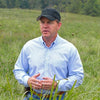February 07, 2018 0 Comments
 Written By Dr. Allen Williams, Ph.D.
Written By Dr. Allen Williams, Ph.D.
A champion of the grass-fed beef industry as well as cutting edge grazing methodology, Allen helps restore natural soil water retention and reduce runoff, increase land productivity, enhance plant and wildlife biodiversity, and produce healthier food. He also serves as Joyce Farms' CRO (Chief Ranching Officer). Learn more about Allen
Last month, NPR published an article that has sparked significant interest among chefs, farmers, and members of the food and agricultural industries at large. The article, found here, points out that the growing popularity of grass-fed beef may soon stall due to the depleting nutritional quality of the grasses being consumed by grass-fed cattle.
The issue raised in this article is very real, BUT it is indicative of ranchers who are grazing very conventionally, and nothing about our program is conventional.
The issue raised in this article is very real, BUT it is indicative of ranchers who are grazing very conventionally, and nothing about our program is conventional. Every one of the ranches sampled in the study are what we call "set stock" or "conventional" grazers. That means they do either no pasture rotations or rotate the cattle between pastures very slowly.
Recent studies pertaining to impact of different grazing practices on soil health parameters and plant species diversity show that conventional grazing practices contribute to a slow degradation of the soil, loss of soil carbon and organic matter, and loss of plant species diversity. However, adaptive grazing practices (part of the regenerative agriculture methods that we practice and teach) do exactly the opposite.
Adaptive grazing practices build new soil organic matter, increase soil carbon, significantly improve plant species diversity and beneficial insect populations (including pollinators), and improve the water cycle. The animals grazing these pastures are healthier as well.

So, while the research presented in the article is concerning, we already know the solution and are actively practicing it. The solutions is biomimicry and eco-mimicry. We are simulating what nature used to do with the positive impact of the large herds of wild ruminants that used to roam the extent of the U.S.
Over the next few weeks, we will continue to address the concerns brought out in this article with other research, and we would be happy to address specific questions in the comments, or you can send us a message.
May 28, 2025 0 Comments
Follow the full journey of our Poulet Rouge® Chicken—from eggs in France to 12 weeks of pasture-centered care on Carolina farms.
